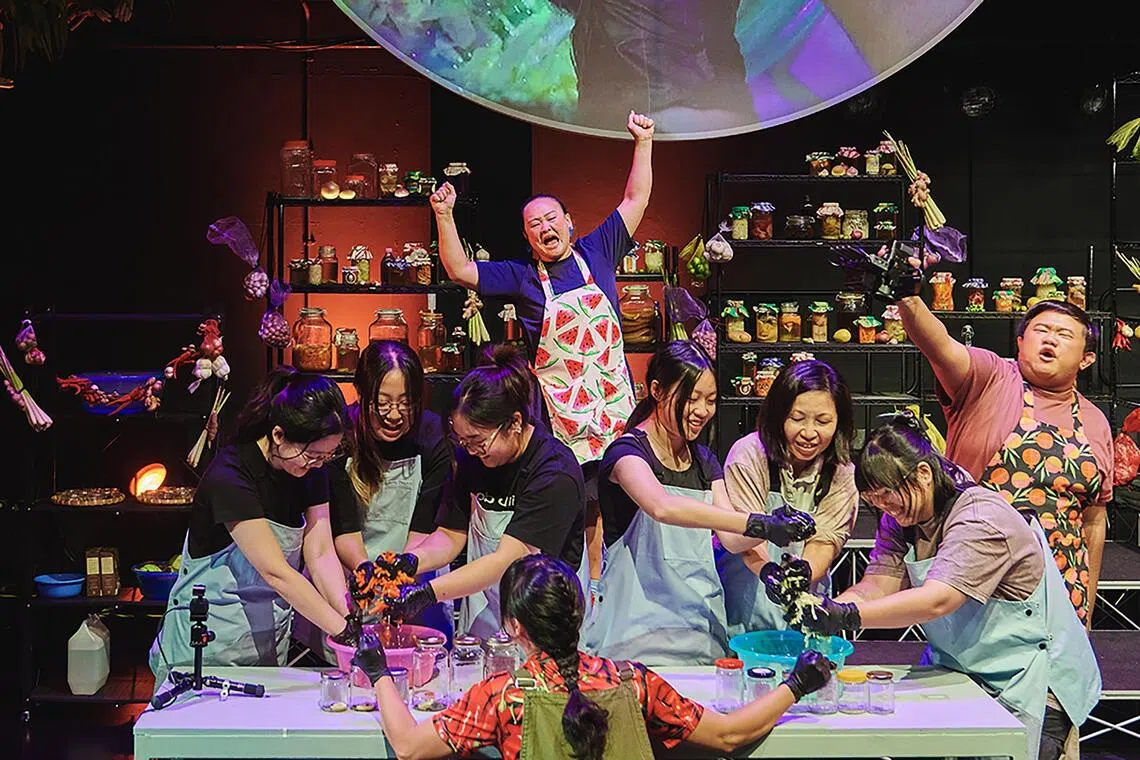Theatre review: Pickle Party is a sour jumble of ideas about food security
Sign up now: Get ST's newsletters delivered to your inbox

The Theatre Practice’s Pickle Party evolved from the theatre company’s pickling workshops at its annexe space over two years.
PHOTO: THE THEATRE PRACTICE
Follow topic:
Pickle Party
The Theatre Practice
Esplanade Annexe Studio
Sept 12, 8pm
This show wants to talk about Singapore’s relationship with food and the anxiety over how the climate crisis affects people’s food sources, but there is something in it that feels forced.
Its veering from lecture to pickling workshop to contrived emotional frustration between two actors with skeletal stories gives it a random quality that barely conjures a vibe, not to mention a point.
It never satisfyingly answers its central proposition of why pickling. Is it just to restore a connection to food? A rather futile regaining of a sense of control amid global uncertainties?
As a solution to the food crisis, it is close to meaningless. Though perhaps as a workshop outside the theatre setting, it may provide a forum that allows people to come together to build communities of care.
Conceptualised and co-directed by The Theatre Practice associate artist Ang Xiao Ting, the amorphous Pickle Party evolved from the multilingual theatre company’s pickling workshops at its annexe space over two years.
Some of the concerns are quintessentially Ang, principally the food anxiety like that which paralysed unsuccessful restaurateur Andrew Marko in her much more effective 2022 work Extinction Feast.
Once more, there is rapping, manipulation of video on semicircular screens, nibbles given to the audience and even the dramatic strings of Ludwig van Beethoven’s Fifth Symphony.
But where Extinction Feast was grounded by a strong solo performance and complex characterisation, the two actors here are never allowed that emotional space.
In kitschy jackets printed with oversized vegetable prints, Min (Elizabeth Loh) and Zul (Izzul Irfan) are emcees and advertisers, then lecturers of how farmland in Singapore has atrophied since independence and people were subjected to a campaign to feel safe eating imported frozen pork.
In between issuing instructions to pickling volunteers who peel vegetables and do their utmost to dehydrate them, Min and Zul strip off their jackets to relate family memories of food in sombre lamentations.
From these, there follow flashes of conflict between the two, conversing about an unrecognisable future of gelato made of air and lab-grown chicken bites, while gesturing at intergenerational blame and worry.
It is much too disparate, not helped that the dramatic choice for these personal expositions is always seriousness and sadness. These are difficult appeals for emotional investment from the audience from carte blanche characters, who in a moment are forced to return to their jovial, fist-pumping selves bidding volunteers to squeeze, dance and pickle.
Min also has a rather bizarre thread linking pickling to her overseas education. She questions her parents’ unwitting belief that overseas is better while speaking about the buzzing energy of resistance movements that have motivated her to do good – a tangential biography that bursts an already overflowing jumble of unshaped ideas.
The set by Tanja Beer and Sophie Dye, though, is beautiful, with rows of shelves of pickle jars and hanging palm leaves. Though this also has the effect of rendering the space rather un-Singaporean, difficult to envisage in a land-scarce environment.
There is a gem of a scene where, using camera and green screen effects, a desaturated Zul appears to make his nostalgic spiel from inside a pickle jar, while Min pours water and vinegar into it, simultaneously drowning and preserving him. This “pickling” of bigger traditions is never quite picked up.
Instead, the audience is left with Min’s mantra of “we control what we can control”. But is it still comforting if what one can control makes no difference? If there are so many unknown factors even in pickling, what solace does that offer for the greater striving?
Perhaps the greatest contribution of Pickle Party is its sly questioning of the progress of Singapore’s 30 by 30 vision, in which the country wants to produce 30 per cent of local nutrition needs by 2030.
Once fussing over water, Singapore should now devote a greater share of its public conversation to food. It is concerning that this is not spoken about with greater urgency in the mainstream – in an era of illusory abundance all hanging by a gossamer thread.
Book It/Pickle Party
Where: Esplanade Annexe Studio, 1 Esplanade Drive str.sg/GLhC
When: Sept 13, 3 and 8pm; Sept 14, 3pm
Admission: From $32
Info:


